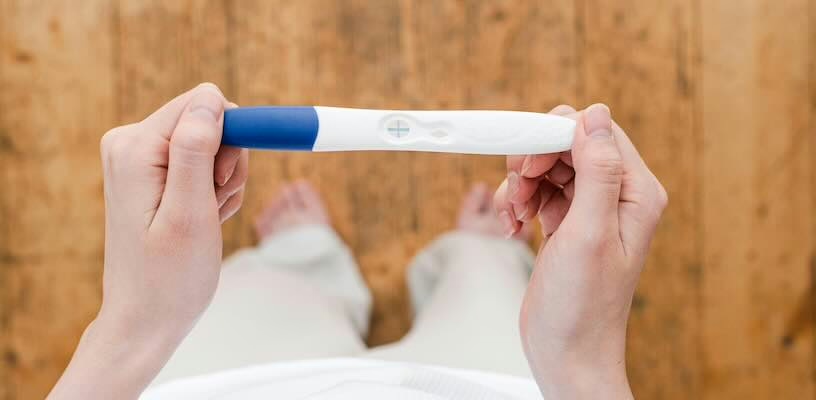What Is Luteinizing Hormone (LH) and What Does It Do?
Luteinizing hormone (LH) is a very important substance that keeps your reproductive system running smoothly.

You may have heard the term “luteinizing hormone” if you’re trying to get pregnant—it usually spikes right before you ovulate each month, when you enter your most fertile window.
However, ovulation isn’t the only thing LH affects. It’s also a catalyst for development during puberty, and it affects sexual function and the sex drive in both men and women.
Let’s take a closer look at the hormone that’s responsible for so many aspects of your reproductive well-being.
What is luteinizing hormone (LH)?
Luteinizing hormone (LH) is a “gonadotropin,” which is a hormone that regulates the testes in men and the ovaries in women.
Again, it plays an important role in sexual development and reproductive health. 1 2 By measuring it, women can often predict when they’re most likely to conceive.
LH is produced by the pituitary gland (a small gland at the base of the brain). It works closely with another gonadotropin, follicle-stimulating hormone (FSH). 3
How does your body produce luteinizing hormone?
LH isn’t controlled by a single organ but by a system called the hypothalamic-pituitary-gonadal (HPG) axis (stay with us). The system consists of three elements: 3 4
- Hypothalamus: Located in your brain, this produces another hormone, called gonadotropin-releasing hormone (GnRH).
- Pituitary gland: GnRH stimulates the pituitary gland (also located in your brain), which then releases LH and FSH into your bloodstream.
- Gonads (testes or ovaries): LH travels to the gonads and makes them produce essential sex hormones like estrogen and testosterone.
Depending on how much sex hormones the gonads produce, the hypothalamus and pituitary gland determine if they should keep making LH or if they should taper off a little. This collaboration keeps your LH levels in a healthy range. 5
What does luteinizing hormone do?
LH regulates various aspects of your reproductive system. Exactly what it does depends on whether you’re male or female, since it has a different function on ovaries and testes.
Its function also changes when you hit puberty and enter adulthood. Here’s a breakdown of what LH does depending on your age and sex.
Luteinizing hormone in children
LH levels are typically low in early childhood. They gradually rise in the years leading up to puberty, often starting their increase between 6 and 8 years old. 5
During puberty, LH stimulates the ovaries or testes to produce more sex hormones:
- Girls: LH sparks estrogen production in girls, leading to many physical changes, such as breast growth, body hair, and the onset of menstruation.
- Boys: It causes boys to produce testosterone, leading to voice changes, body and facial hair growth, and sperm production. 5
Luteinizing hormone in adult women
When women enter adulthood, LH becomes very important for regulating menstrual cycles and fertility.
In the early stages of your cycle, it helps your ovarian follicles (the small sacs holding your eggs) mature. 2 When you enter the middle of your cycle (around days 11–14), your LH levels rise. This LH surge triggers ovulation (the release of a mature egg) and the production of progesterone (a hormone that prepares your uterus for pregnancy). 6 2
As you age and approach menopause, your body’s estrogen and progesterone levels naturally drop. In response, your baseline LH levels increase. 5
Luteinizing hormone in adult men
In men, LH prompts cells in the testes to produce testosterone, the main male sex hormone. 1 As mentioned, this is responsible for making sperm and developing male characteristics, such as increased muscle mass and a deeper voice.
Unlike in women, LH levels in men typically remain relatively stable after puberty. 5
When and how should you check your LH levels?
If you’re female and trying to conceive, you can check your LH levels for surges throughout the month. Doing so allows you to pinpoint your fertile window and plan intercourse.
The easiest way to do this is by using ovulation test strips, also known as ovulation prediction kits (OPKs), which you can buy over the counter. Ovulation test strips look for the presence of LH in your urine and usually display a visual signifier, like a dark line, that indicates whether your levels are high enough to suggest you’ll ovulate soon.
Other methods of tracking ovulation
There are other ways to predict ovulation, including watching for common ovulation symptoms. You can:
- Chart your basal body temperature (BBT)
- Use an ovulation calculator
- Monitor your vaginal discharge (ovulation discharge has a different color and consistency than regular cervical fluid)
Employing all of these methods is especially helpful if you need to track ovulation with irregular periods, since an irregular cycle can make everything much harder to predict. You may also want to consult a fertility specialist for tailored guidance.
When is your doctor likely to check your LH levels?
OPKs don’t tell you exactly how much LH you have—they just check if you have enough that you’re likely to ovulate soon.
You can get a more precise idea of your LH levels with a blood test, but that probably isn’t something you can perform on your own. Your doctor may order a blood draw to check your LH if you have: 5
- Fertility issues
- Severely irregular periods
- A low sex drive
- Erectile dysfunction (in men)
They may check your child’s LH levels if they have signs of either early or delayed puberty. 5
If you’re undergoing fertility treatments, such as in vitro fertilization (IVF), your doctor also may monitor your LH levels throughout the process to optimize the outcome.
What are normal LH levels?
Normal LH levels vary depending on sex and age. As you now know, they also change throughout the month for women who menstruate.
Check out the following chart for some general ranges for adults. 7 You’ll see figures like this if your doctor orders a blood test to check your LH level; OPKs don’t return results with this level of precision.
Normal LH Levels Depending on Sex and Life Stage
| Sex and factors | LH levels (in international units per milliliter, IU/L) |
|---|---|
| Women, weeks 1–2 of the menstrual cycle | 1.68 to 15 IU/mL |
| Women, around day 14 (midcycle peak) | 21.9 to 56.6 IU/mL |
| Women, weeks 3–4 of the menstrual cycle | 0.61 to 16.3 IU/mL |
| Women, after menopause | 14.2 to 52.3 IU/mL |
| Men | 1.24 to 7.8 IU/mL |
Again, children’s LH levels will be lower than those, and won’t rise until puberty.
What does it mean if your LH levels are unusually high or low?
An abnormally high level of LH can indicate an issue with your ovaries or testicles (e.g., they didn’t fully develop or were damaged). Hormonal imbalance conditions like polycystic ovarian syndrome (PCOS) and genetic conditions like Klinefelter syndrome (KS) may also cause LH to rise. 5 8 9
On the other hand, unusually low LH levels suggest there might be something wrong with your pituitary gland or hypothalamus. This can lead to infertility in both men and women. 5 The same effect can also be seen in women with very low body fat, such as athletes (or women with eating disorders).
In children, a high LH level is usually a sign of early puberty, while a low LH level is a sign of delayed puberty. In rare cases, early or late puberty is linked to a larger medical issue, such as a brain injury or autoimmune disorder. 5
Regardless of what the potential cause is, the important thing is to cooperate with your doctor, which means undergoing any further testing they want to do and following their medical advice. An abnormal LH level isn’t an issue you need to solve on your own.
Final thoughts
LH is an important hormone, and it’s especially important for people who are trying to conceive. You may hear your doctor mention this term when discussing your reproductive health. Now, you’ll immediately understand what they’re talking about.
Article Sources
- National Cancer Institute. "luteinizing hormone" Retrieved June 11, 2025.
- National Institute of Diabetes and Digestive and Kidney Diseases. "Gonadotropins" Retrieved June 11, 2025.
- StatPearls. "Physiology, Luteinizing Hormone" Retrieved June 11, 2025.
- MedlinePlus. "Hypothalamus" Retrieved June 11, 2025.
- MedlinePlus. "Luteinizing Hormone (LH) Levels Test" Retrieved June 11, 2025.
- MedlinePlus. "Pregnancy - identifying fertile days" Retrieved June 11, 2025.
- UC San Diego Health. "Luteinizing Hormone (Blood)" Retrieved June 11, 2025.
- MedlinePlus. "Polycystic Ovary Syndrome" Retrieved June 11, 2025.
- MedlinePlus. "Klinefelter Syndrome" Retrieved June 11, 2025.







